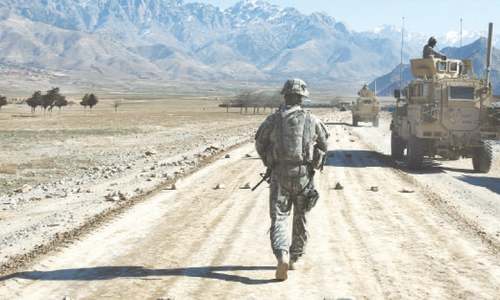WASHINGTON: US President Joe Biden looks forward to welcoming Afghan President Ashraf Ghani and Dr Abdullah Abdullah, Chairman of the High Council for National Reconciliation, to the White House on June 25, the White House announced on Sunday.
“The visit will highlight the enduring partnership between the United States and Afghanistan as the military drawdown continues,” the White House said. “The United States will remain deeply engaged with the government of Afghanistan to ensure the country never again becomes a safe haven for terrorist groups who pose a threat to the US.”
The White House also assured Afghanistan that the United States was committed to supporting the Afghan people by providing diplomatic, economic, and humanitarian assistance to the Afghan people, including Afghan women, girls and minorities.
The statement also said that the United States “continues to fully support the ongoing peace process and encourages all Afghan parties to participate meaningfully in negotiations to bring an end to the conflict.”
Michael Kugelman, a US scholar of South Asian affairs, said it was an important visit, and “the fact that Ghani and Abdullah are coming to Washington together is as significant as the visit itself.”
The two leaders are seen in Washington as adversaries and US policymakers fear that continued tension between them could jeopardise the peace process.
“One of President Biden’s main goals will be to reassure the two leaders of a continued US commitment to Afghanistan, post-withdrawal,” Mr Kugelman said.
Other media commentators, however, pointed out that “support to the Afghan military is not mentioned in the White House statement.
Mr Kugelman, a deputy director at The Wilson Centre, Washington, agreed with this observation but pointed out that the Pentagon had already stated its commitment to continue funding the Afghan Security Forces. “I’m actually surprised the peace process didn’t get a more prominent and early mention,” he added.
Some commentators saw the invitation as an effort to keep the Kabul government in power after the US withdrawal, adding that the lack of Soviet support caused the then Afghan president Najibullah’s fall and murder by the Taliban.
Some commentators also referred to Prime Minister Imran Khan’s “absolutely not” statement on Saturday, underlining Islamabad’s decision of not offering its territory for operations inside Afghanistan after the US withdrawal.
Although the official schedule requires all US troops to leave by Sept 15, reports in the US media suggest that the Pentagon could complete the pullout by July 15.
Published in Dawn, June 21st, 2021














































